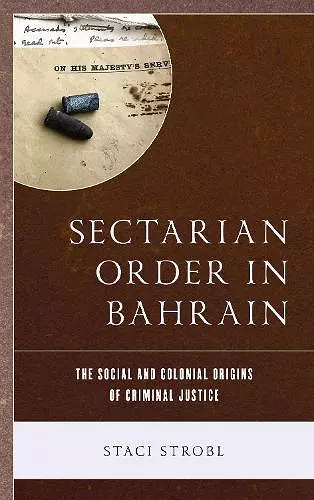Sectarian Order in Bahrain
The Social and Colonial Origins of Criminal Justice
Format:Hardback
Publisher:Lexington Books
Published:29th Aug '18
Currently unavailable, and unfortunately no date known when it will be back

Sectarian Order in Bahrain connects the rise of colonial criminal justice in Bahrain and sectarianism, making detailed use of an archival cache of colonial criminal court cases in the British Library, and offering a critical analysis. Using primary and secondary historical documents, including ethnographic and anthropological accounts, the book links major themes in critical and cultural criminology, southern criminology, historical sociology, post-colonialism, and Gulf studies which have not been adequately examined together. It drills down on an important group of surviving criminal court case files, and shows how they can describe the problem of and inform solutions to sectarian discrimination in Bahrain. There are two major shifts in notions of the social order and order maintenance that characterize the 20th century, highlighting a sectarianism modus operandi within the colonial criminal justice system. The shifts are the criminalization of inter-tribal competition and honor-based modes of behavior in order to prevent intra-Sunni contestation and to unite Sunnis under Al-Khalifah and colonial authority; and the invention of indigenous Shi’a and Persian Bahrainis as a criminal class as an extension of the sectarianism long practiced by the Al Khalifah (and other Sunni tribes). Together these two shifts birth a modern criminal justice system that institutionalizes Sunni chauvinism and Shi’a discrimination, problems evident in the Bahraini criminal justice system today.
Sectarian Order in Bahrain is an innovative contribution to the literature on Gulf politics and the sociology of policing. Weaving together scrupulous historical research, ethnographic fieldwork, and theories of criminology, Staci Strobl traces the roots of contemporary sectarian discrimination in Bahrain to the practices and narratives of British colonial administration. This is a work of great empathy and authority that will interest scholars of the Gulf as well as anyone studying the intersection of identity, history, and social justice. -- Frederic Wehrey, Carnegie Endowment for International Peace, author of Sectarian Politics in the Gulf: From the Iraq War to the Arab Uprisings
Sectarian Order in Bahrain is a fascinating book that investigates the history of criminal justice of a former British colony. Drawing on extensive primary and secondary sources the book illustrates how the colonial criminal justice system institutionalized Sunni hegemony while discriminating against Shi’a population of Bahrain by de-legitimizing tribal systems of authority and social control. This meticulously researched book adds to a growing innovative body of new studies drawing inspiration from southern and cultural criminology and theories of post-colonialism. The book should appeal to a wide readership across the social sciences - history, sociology, criminology, anthropology and religious studies. -- Kerry Carrington, Queensland University of Technology
Empirically rich and conceptually original, Staci Strobl’s fascinating book traverses several academic disciplines to shed light on the historical experience that has shaped sectarian relations in modern Bahrain. Combining criminology, ethnography, historical sociology and postcolonial theory, Strobl unpacks the social and political construction (and reproduction) of modern sectarian categories and hierarchies in Bahrain as evidenced through the criminal justice system. In addition to its contribution to criminology and history, this book is a valuable contribution to the study of sectarian relations. Going beyond the bland instrumentalism and stultifying binaries that dominate the literature, Strobl illuminates how sectarian identities are socially and politically perceived, used and experienced by Bahrainis today. This she achieves with a fascinating ethnographic and historic examination of Bahrain’s criminal justice system, its colonial history and its nation/state-building efforts and how these have cast a heavy shadow on sectarian identity and sectarian relations today. -- Fanar Haddad, Middle East Institute, NUS
This detailed historical study shows how the rise of political sectarianism is deeply intertwined with the growth of the modern state apparatus, in particular with the criminal justice system. The book makes a real contribution to scholarship of the British Empire, the Gulf States, and Sunni-Shii relations. -- Toby Matthiesen, St. Antony's College, University of Oxford
ISBN: 9781498541602
Dimensions: 230mm x 158mm x 22mm
Weight: 562g
192 pages